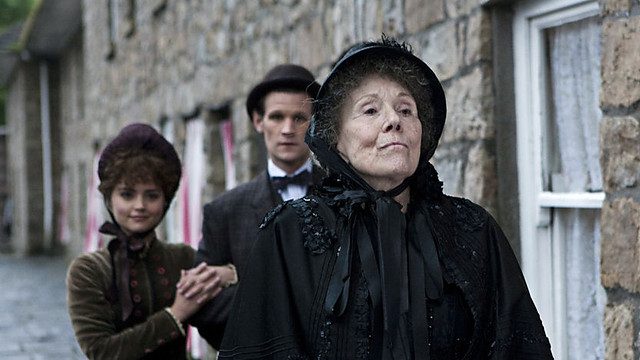Doctor Who Series Blog – The Crimson Horror
Doctor Who Series Blog – The Crimson Horror
Daniel Cope
I’m always very dubious when producers label an episode as a ‘romp’. It feels like a euphemism for an episode that’s all about visuals and jokes rather than character-led, emotional drama. Whilst, The Crimson Horror is definitely this series’ romp it thankfully sustains a sense of fun without overlooking dramatic engagement.
The episode opens deep in the heart of Yorkshire in the bowls of the new factory, Sweetville. The factory’s head-honcho, Mrs Gillyflower, is played by the delightfully sinister Dame Diana Rigg who turns in an entertaining performance as the antagonist of this episode. Gillyflower feels like an old-fashioned Doctor Who baddie, delivering lines such as “my plans must be accelerated” with enough tenacity that it prevents her becoming something of a farce. Gillyflower intends to release a poison with the help of an alien leech that is referred to as, rather misleadingly, ‘Mr Sweet’.
Rachael Stirling, Rigg’s real-life daughter, plays her on-screen daughter Ada, making their emotionally-charged scenes together bristle with energy. In fact, Stirling’s scenes really are this episode’s highlight. Ada’s journey from complete submission toward her mother’s cold commands and then to utter rage upon discovering her twisted mother’s betrayal is astutely-handled. Sterling is venomous as she vents her despair that her own mother blinded her for the sake of an experiment. Rigg’s Gillyflower responds by upping the stakes of ‘bitter and twisted’ as she takes her daughter by gunpoint. Rigg’s desperately evil smirking positions you alongside the Doctor as he announces grimly “she would” when Clara doubts Gillyflower’s capability to murder. The climax feels more whole than in recent weeks because as a viewer you believe that Ada is in genuine peril, whereas last weeks’ timey-wimey climax might have disrupted the emotional investment.
Conversely, Ada’s empathy toward the venom-infected Doctor is also poignant. The scenes in the cellar, where the blind Ada professes to care for her verbally and psychically incapacitated “monster” (aka the Doctor) draws parallels with Marry Shelley’s Frankenstein. For the viewer to see the Doctor so psychically deformed it is genuinely alarming. For once he is the one who needs help.
The help comes in the form of the Paternoster gang made up by a civilised Sontaran, a lizard from the dawn of time and her action-ready wife Jenny (all played with relish by Dan Starkey, Neve Mckintosh and Catrin Stewart). These characters are making their return since last year’s Christmas special The Snowmen so they naturally have a few questions about the very-much alive Clara. They last saw her fall to an untimely death of course! It is a pity then that we don’t get much more in the way of development towards answering the ‘Clara mystery’ but since this is clearly a stand-alone episode, on the whole, it is probably a wise move. So with the Doctor and Clara somewhat side-lined for parts of this story, Catrin Stewart finally gets to shine as Jenny. Stewart juggles the episodes first quarter going on a covert, lock-picking investigation worthy of any potential Doctor Who companion and getting off to show some combat skills that makes even the Doctor’s sonic screwdriver coy of its abilities.
Matt Smith and Jenna-Louise Coleman’s wit-driven dynamic continues to impress. They get a chance to imitate the Yorkshire accent to such an extent you can’t help but the feel the TARDIS took a detour to Emmerdale village before this adventure. Matt Smith has said on many occasions that he wants to wear an assortment of quirky hats and he gets his wish as he adds a bowler hat to the growing list this week. Smith’s performance is as always consistently entertaining and psychically-driven whilst he frantically pleads for Ada’s life to be spared at the episodes climax. Coleman meanwhile, gets less to do this week but finds herself in something of an awkward but amusing situation come the episodes end, when the children she nannies find out about her time-travelling antics.
This week was a solidly entertaining forty-five minutes of a Mark Gatiss script. It isn’t a stellar episode by any means – you never really get a firmly satisfying sense of just why Gillyflower wants to endanger the whole planet with the poison. Perhaps it is the leech’s influence or Gillyflower’s insistence on Victorian values that the “apocalypse” is indeed approaching and a resistance must be prepared? However, it is hard to complain when the production values are so consistently vibrant. Director Saul Matzstein even cleverly crafts a flashback containing some heavy exposition with a periodically-relevant sepia aesthetic. So then, a good-old ‘romp’ which will not be an instant classic but certainly well-received nonetheless.

Comments